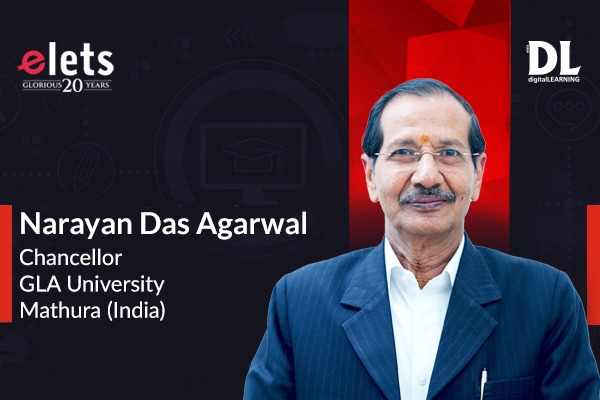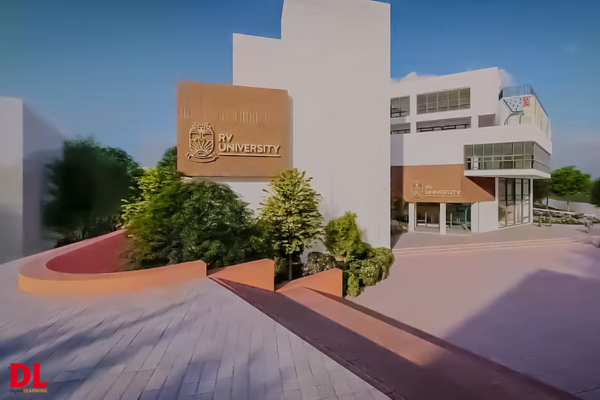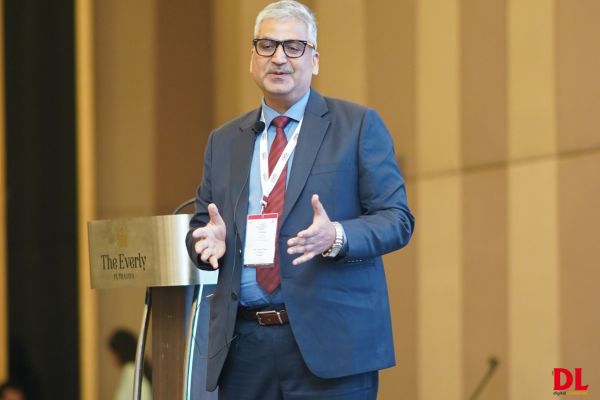The realm of education is currently experiencing substantial changes, primarily driven by technological advancements and, significantly, through international partnerships among countries. The recently concluded G20 summit serves as a significant milestone in these global collaborative efforts, encompassing not only education but also various other sectors. It’s worth noting that the G20 nations, collectively responsible for 85% of the world’s Gross Domestic Product (GDP) and 75% of global trade, play an indispensable role in the global economy.
The world’s increasing reliance on technology pulled the education system fully into the digital age and hybrid learning models have increasingly become popular. The education sector has witnessed tremendous growth after the adoption of technology. The sector has immense possibilities to expand and grow in every horizon. It would be appropriate to say that education knows no borders in a world shaped by technology. As we steer through the currents of globalised education, it becomes crucial to cultivate an inclusive and forward-looking perspective, one that equips students to meet the opportunities and hurdles that lie ahead. By embracing cultural diversity, nurturing global skills, harnessing technology, and instilling a sense of global citizenship, we can enable the upcoming generation to excel in an interconnected global landscape.
Today, there is a growing need for inventive educational approaches that offer a flexible ‘anytime, anywhere’ learning model. The emphasis on fresh, creative, and applicable skills has surged significantly, with 88% of students expressing the desire for educational institutions to impart career-focused skills in preparation for the demands of the 21st-century workforce. On a positive note, nearly 90% of women worldwide are proactively pursuing changes in their career trajectories, with 81% seizing the pandemic as an opportunity to reassess their life and career choices. Education sector is at the forefront of global development, with Global Education’s earnings per share rising from ₹6.11 to ₹13.58 in the past year.
Advancement in Education Worldwide
Innovation in education extends beyond the realm of new technology; it revolves around finding inventive and straightforward solutions to address genuine issues, ultimately fostering fairness and enhancing the learning experience. Innovative approaches can encompass various facets, such as programs, services, procedures, products, and collaborations. For instance, consider tailor-made educational games delivered via solar-powered tablets, revolutionizing math instruction for children in remote Sudanese regions. Alternatively, think of digital learning platforms designed to teach the language of instruction to refugees and marginalised children in Greece, Lebanon, and Mauritania. These examples exemplify how innovation can drive positive educational outcomes through creative means.
“Innovation in education means solving a real problem in a new, simple way to promote equitable learning.” – UNICEF
To curb the challenges, initiatives like the one in Ghana, where local mothers and grandmothers are empowered to lead early childhood education efforts can be efficient. Numerous innovators are actively engaged in classrooms and communities. UNICEF, in collaboration with its partners, plays a crucial role in identifying, nurturing, and expanding promising innovations that contribute to realising every child’s fundamental right to access education.
A lot of other countries are witnessing excessive developments. For instance, the preferred countries for higher education, Australia, the USA, Canada and the UK have emerged as top destinations owing to eased visa rules or mobility restrictions, the availability of scholarship opportunities is also immense. Reformed immigration policies of the UK and Canada about work visas have further powered students’ global education aspirations. In a recent report by a UK-based fintech company, there was a 98% increase in study abroad loan applications in the first three months of 2022 when compared to the same period of the previous year.
Countries are being cautious when embracing emerging trends like AI in education, aiming to harness its benefits rather than succumbing to potential drawbacks. According to a recent UNESCO report, by the end of 2023, approximately 67 nations will develop national strategies for AI. Out of these, 61 could be categorised as comprehensive AI strategies, including India’s National Strategy on AI. India is significantly contributing to uplifting the global education landscape from collaborating with various countries on the education front, to attract Ivy League campuses to its shores – This all shows India’s openness to educational advancements.
Furthermore, Indian students studying abroad are achieving remarkable success, underscoring the quality of education they receive. For instance, the presence of Indian students in Australia is actively working to position it as a preferred destination for students seeking international education opportunities, as per the strategic partnerships with the Indian government and Australia.
Additionally, according to the recently concluded G20 summit, themed “One World, One Future,” education is poised to become as accessible across borders as any other commodities, thanks to the ongoing global advancements in this field.
India’s Endeavor to Expand Its Global Educational Footprint
The Indian education sector has witnessed increased private investments and collaborations with international brands to provide an internationally recognised standard of education.
Various initiatives, MoUs, and collaborations can be seen across nations as a result of these interconnected relations with a bigger goal of thriving in education. India’s step towards opening up gates for foreign varsities to establish campuses in India is one of the majors. Recently, in the presence of the honourable Prime Minister of India, Narendra Modi, and President of US – Joe Biden, Indo-US collaborates to strengthen research. In March this year, India signed an MoU with Australia regarding mutual recognition of University, Vocational, and School qualifications in both countries. This agreement will help the students of both countries to study in either country as their qualifications will be recognised and will be valid in both countries.
Enhancing its education base in the UAE, India signed an MoU with UAE on cooperation in the field of education. Additionally, PM Modi’s visit to UAE in June 2023 resulted in a mutual agreement to open IIT Delhi’s campus in Abu Dhabi which is expected to start in January next year.
Be it the UAE or the US, India is making its mark in the education landscape. The educational compass of India is expanding its horizons beyond the restricted walls and bringing a lot of opportunities not just to India but to foreign students as well.
UNICEF, in collaboration with its partners, plays a crucial role in identifying, nurturing, and expanding promising innovations that contribute to realising every child’s fundamental right to access education.
A Glance at Forging a Powerful Educational Environment
To achieve global educational goals, some key components that need continuous attention and rapid development with the changes happening all across. Here are some of the few to create an impactful educational ecosystem–
Advanced Educator Community: Teacher communities are vital for a thriving education ecosystem. They offer a platform for educators to share resources, collaborate on lesson plans, and provide emotional support, enhancing their ability to address challenges and stay updated on educational trends. Encouraging collaboration and open communication among teachers, students, and administrators fosters an inclusive and engaging learning environment.
Latet Educational Content: Another crucial aspect of a strong educational ecosystem is interactive content. It offers engaging learning experiences and can be tailored to suit individual student needs. To make this work effectively, a complete hardware and software solution is necessary, including devices like View Boards, tablets, or laptops that can run interactive content and software like my View Board for content creation and display. ViewSonic provides a range of resources and tools designed specifically for educators.
Teacher Training and Development: In addition to teachers using interactive whiteboards, professional development (PD) is a critical component of an effective education ecosystem. PD opportunities help educators continually enhance their skills and knowledge, ultimately benefiting students. These sessions keep teachers updated on the latest teaching methods, technologies, and trends, as well as strategies to address common classroom challenges. Moreover, PD fosters collaboration and the sharing of best practices among teachers. Peer to-peer learning enables educators to learn from each other’s experiences and expertise. By providing PD and training on interactive tools, teachers are better equipped to address classroom issues, both locally and globally.
Government Initiatives and Support: The government plays a vital role in shaping education policies and funding initiatives, crucial for scaling local education programs. Government support is essential for successful endeavours, like establishing esports programs in schools. This support includes funding and guidance. Collaborations with local tech companies, sponsors, and non-profits can help identify funding sources, resources, and partnerships.
With these considerations in mind, Elets Technomedia has been actively engaging with the ever-evolving landscape of global education since 2011. This year, we’re gearing up for the forthcoming edition of the World Education Summit (WES), which will be held on an international scale in Malaysia.
WES Making an Undeniable Mark in the Global Education Realm
Celebrating its remarkable journey of success, Elets World Education Summit (WES) will embark on a journey, this time in Malaysia with a focus on driving future-ready innovations and providing opportunities to forge countless collaborations with leading global educators and edtechs. This most influential and longest-running event specifically addresses the burgeoning demand for new technologies and practical insights for smart educational practices to thrive in today’s highly competitive digital world.
The World Education Summit will feature an impressive lineup of speakers, including experts from both higher education and school education. They will generously impart their wisdom, partake in meaningful discussions, and offer profound insights into the ongoing developments, challenges, and prospects within the education arena. Let’s tap on the words of some of the leaders joining us for the most anticipated summit.
Final Thoughts!
Similar to a natural ecosystem’s intricate web of interconnected parts, constructing an education ecosystem entails assembling a cohesive set of components within an environment that nurtures effective teaching, learning, and development. In the pursuit of establishing an impactful educational realm, educators worldwide are poised to embrace innovative practices, illuminating the path to a brighter future.
As we usher in the era of education’s evolution, it is through collective collaboration, continuous innovation, and a shared dedication to delivering high-quality education that we can authentically revolutionise the global learning landscape. The World Education Summit in Malaysia serves as a living testament to this grand vision, as we collaboratively shape the educational destiny for future generations on a global stage.


























